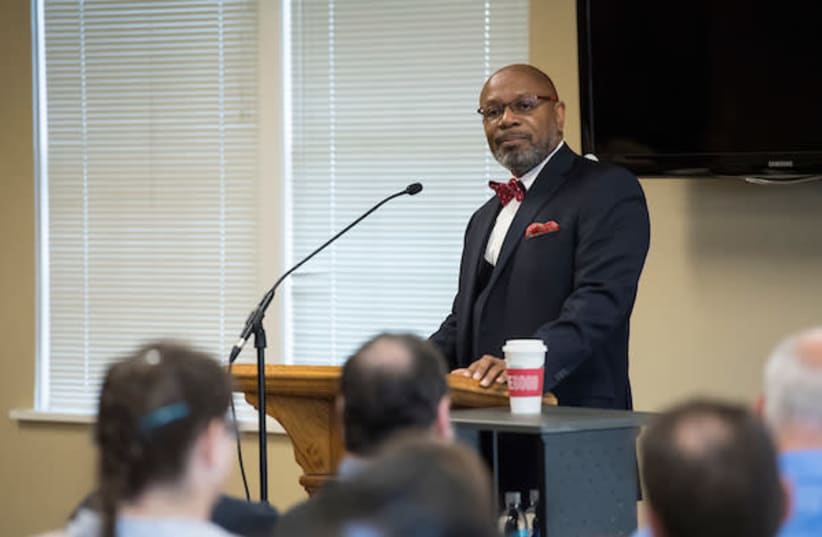In the latest developments in an ongoing controversy at Linfield University over the firing of a tenured Jewish professor who accused the school of antisemitism, a report from the local branch of the NAACP found that the Oregon school’s president was subjected to racism at the school.
In addition, the school’s president, Miles K. Davis, told the Chronicle of Higher Education that he had in fact made a comment about the size of Jewish noses to Daniel Pollack-Pelzner, the professor who was fired this week. Davis had previously denied making the comment, and an investigation into him had concluded based on his denial that the comment could not be substantiated. He told the Chronicle that his comment had been informed by his time in the Middle East.
Davis invited the NAACP to investigate whether he was subject to racist treatment after he was accused both of antisemitism as well as sexual assault. Last week, the faculty of Linfield’s College of Arts and Sciences overwhelmingly called for his resignation. The Anti-Defamation League and Oregon Board of Rabbis also asked him to resign.
The NAACP report, published Friday and sent to the Jewish Telegraphic Agency, says Davis was treated unfairly due to racism at the school. Davis is Linfield’s first Black president, and the report said that since 1970, no Black people have been elected as faculty trustee or faculty executive chair.
At Linfield, the report says, “deeply-held resistance to Black leadership and culture fueled the ferocity of resistance to organization change.” The report also said that Davis had not had time to “build a rapport with the faculty and staff” at Linfield because he needed to make changes quickly.
“We find that President Davis has been subject to numerous instances of unfair treatment since his arrival in July 2018, and this unfair treatment of personal attacks were due to being a Black man,” the report says. “President Davis has been accused of being divisive, intimidating, combative, aggressive, disrespectful and abusive. This coded language plays off racist and toxic stereotypes with a long history in this country.”
Pollack-Pelzner — whose case has become a cause celebre among American academics — did not agree to speak with the NAACP for its investigation, and the report does not substantively address his termination or his allegations, relying instead on the independent investigation that could not substantiate them.
But Pollack-Pelzner told JTA that “there’s a real issue of institutional racism at Linfield” and said that allegations against white members of the board had never been investigated, while allegations against Black members had been. “If the NAACP would like to talk with me I would be happy to speak,” he said, but he noted that the group had not responded to a list of questions he and several other professors had sent them about the investigation.
The report’s only reference to the allegations of antisemitism comes in a rebuttal to the Jewish organizations that demanded Davis’ resignation. Pollack-Pelzner and two other professors accused Davis of making antisemitic comments about Jewish noses and the Holocaust, but Davis denied the allegations. Due mostly to Davis’ denials, an independent investigation could not substantiate the allegations.
Based on that investigation, the NAACP criticized the ADL and Oregon Board of Rabbis for calling on Davis to resign. The ADL, the report says, “failed to conduct any independent investigation, preferring to simply believe the complaint despite the fact the University had already conducted an independent review. Further, the Oregon Board of Rabbis also called for the resignation of President Davis without talking with him or conducting an investigation of any kind.”
The local ADL representative did not respond to a call for comment on Friday. Rabbi Eve Posen, president of the Oregon Board of Rabbis, told JTA that “the Oregon Board of Rabbis is interested and would be more than happy to work with the NAACP,” but did not elaborate.
Reginald Richardson, the president of the local NAACP chapter, told JTA that he trusted the independent investigation of the antisemitism claims, and that Pollack-Pelzner’s firing was outside the scope of the NAACP report.
“As I understand it from the documents we reviewed, the allegations of antisemitic comments were investigated by the university, so that was litigated and resolved,” he said. He said Pollack-Pelzner’s firing was “a personnel issue that I’m not a party to and I have no opinion one way or the other about it.”
Pollack-Pelzner’s firing has led to an outcry among professors worldwide. Linfield by-laws require a lengthy process including multiple hearings, which did not happen in Pollack-Pelzner’s case. Davis told the Chronicle of Higher Education that the school’s faculty handbook had “not been updated” and said a “number of things in that handbook that are not valid.” He added that “Our legal representation feels very comfortable with the basis for his termination.”
The handbook was last updated in January of this year, according to the Chronicle.
An open letter signed by more than 1,800 professors says that Linfield denied Pollack-Pelzner due process.
“Linfield has fired Pollack-Pelzner both as a punishment for his publicly holding the University responsible and as a warning to every other member of the faculty,” the letter says. His termination, the letter says, threatens to “set a precedent that will eviscerate the foundational principles of both free speech and of faculty governance on university campuses.”
